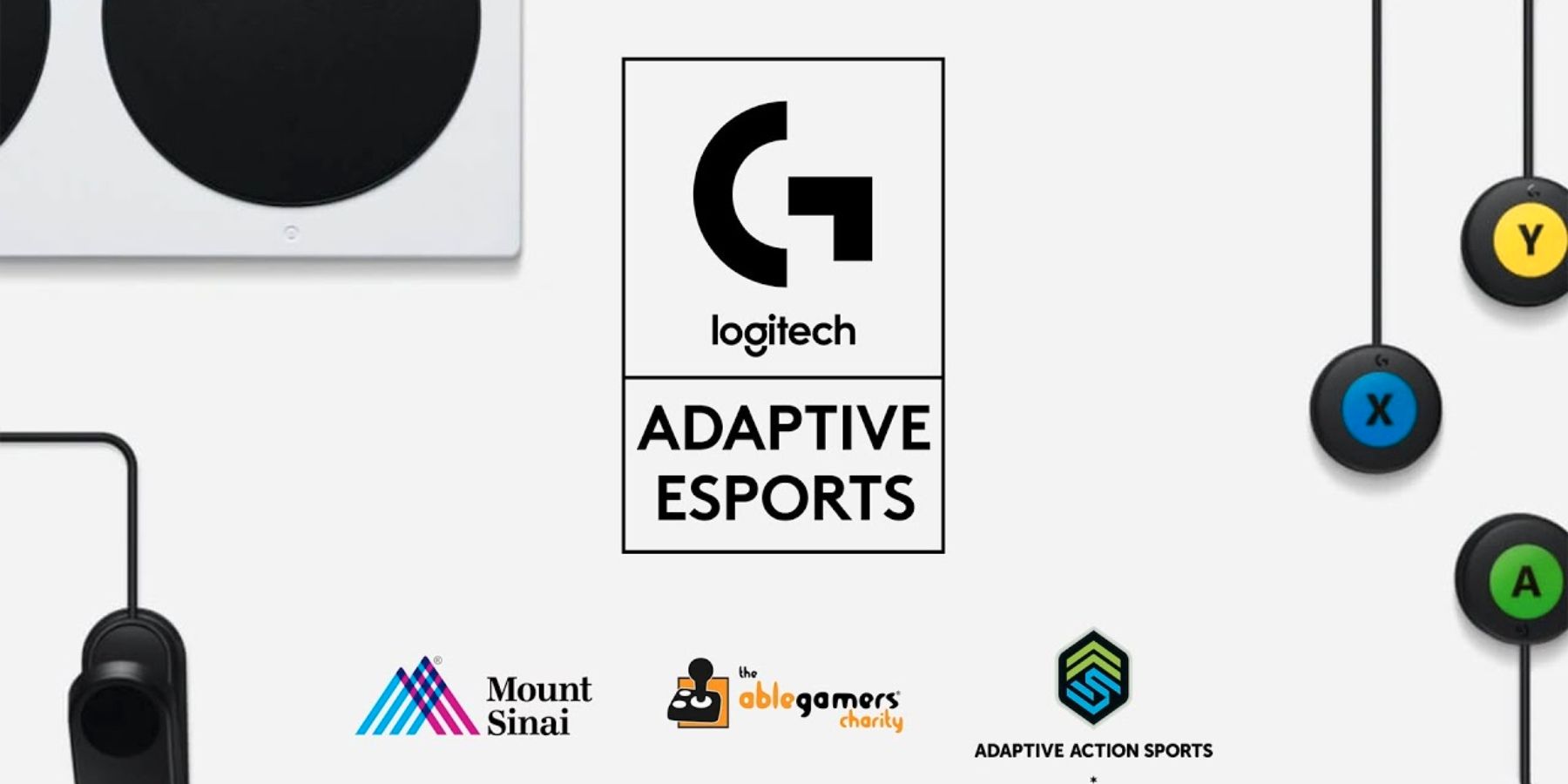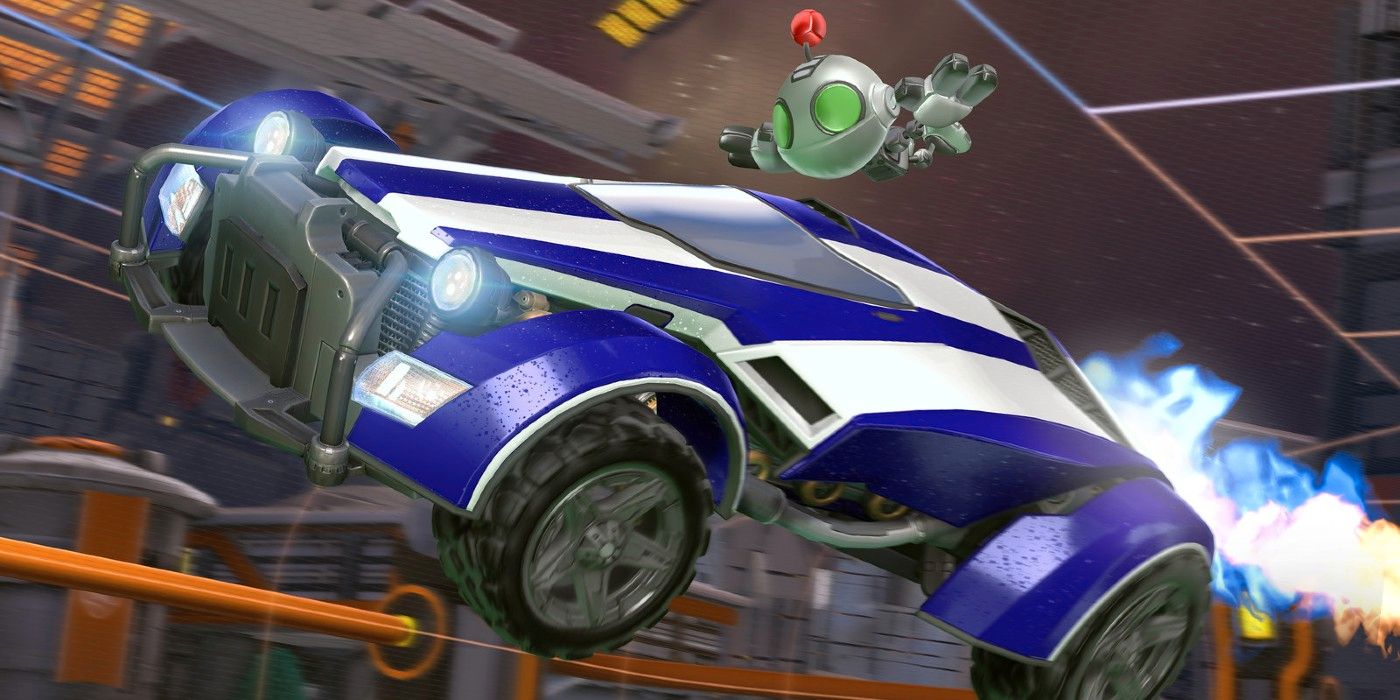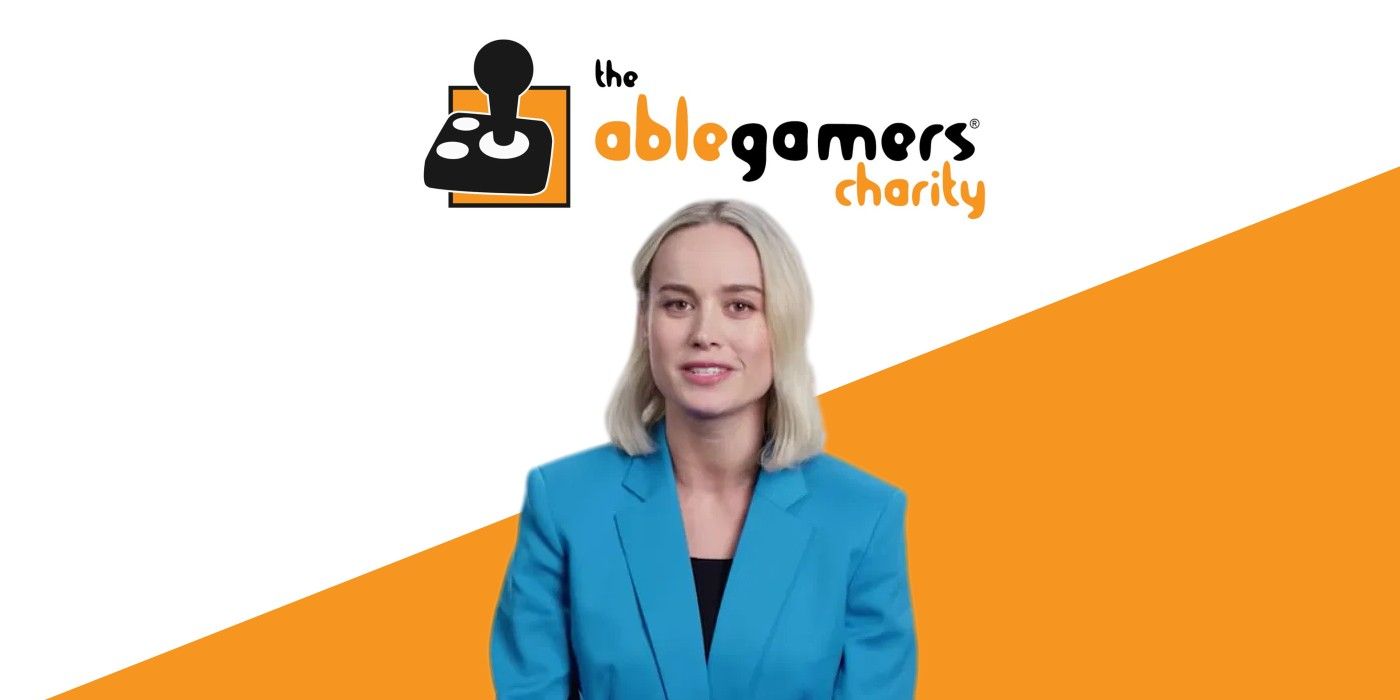Accessibility for gamers with disabilities has been a long-time problem in the industry. While developers, publishers, and hardware manufacturers have developed ways to become more accessible, there is still work to be done - especially in the esports community. Last weekend, Logitech G, AbleGamers, Adaptive Action Sports, and the Mount Sinai Health System hosted the Adaptive Esports Tournament to give players with disabilities a chance to shine and compete in a 2v2 Rocket League competition.
In an interview with Game Rant, AbleGamers COO Steven Spohn shared how the Adaptive Esports Tournament aims to give players with disabilities a platform, not only to compete but also to form communities and build lasting friendships. Spohn talks about how the tournament was conceptualized, how games such as Rocket League became more accessible, and how the industry in general has grown to become more inclusive of gamers with disabilities. Interview has been edited for clarity and brevity.
RELATED: Xbox Reaffirms Commitment To Creating Accessible Games
Q: Tell us about the partnership between AbleGamers and Logitech G.
A: The wild thing about being a part of the gaming industry is that esports have so many events made for people with various abilities. But there is nothing mainly made for people with disabilities, and my very good friend Ujesh Desai of Logitech G and I had a cool meeting with Adaptive Action Sports. We concluded that every kind of event in the world of sports has a tier for people with disabilities to compete and see who is the best of the best, such as the Paralympics and the Special Olympics. So, the big question now is, why isn't there an esports tournament for people with disabilities?

There wasn't that kind of the same adaptiveness in esports. So, what came about was a very brief conversation discussing whether the Adaptive Esports Tournament is a thing that people want. Is this a thing that the community is desiring? And you know, we got to bring our partners over at Mt. Sinai Health System, and the four of us together sort of had this conversation whether or not this something we can do. If so, how would we do it? And how would we make it different than other people who have tried before?
We're not the first people who tried it, we're just the first group that successfully made it a big tournament. The problem with these kinds of things is how do you make it fair, and how do you get people excited? How do you bring in the right competitors? How do you get word to people with disabilities that this thing even exists? So those were all the challenges that we had to learn to tackle, and it's a very fun learning experience, reaching out to the community.
Q: Why was Rocket League chosen for the tournament?
A: Rocket League is one of those amazing video games that allow us to set the stage so that people can be excited about a video game. Everyone knows the name Rocket League. Everyone likes playing it. And the game is more about being tactically aware of the field and where the other cars are, and it gives players some excitement, especially hearing the crowd roar when you hit a goal. So we thought Rocket League was perfect, and the game has been a great partner at AbleGamers for years now. We use Rocket League as our demonstration game at our physical events before the pandemic on how to use adaptive video game equipment.
It's just that adaptive technology has a steep learning curve. It's not easy to learn to play with your mouth or play with just one hand, it takes some teaching, and Rocket League has this great combination of a game that allows flexibility to learn how to do those things. I personally have Spinal Muscular Atrophy, which is a sister disease to ALS, and it basically means that I'm getting slowly weaker as time goes on. So I only play with a mouse and a hat on my head, and I'm still able to be in the low levels of diamond in Rocket League. Because the game relies on teammates, it depends on your ability to be there when your teammates need you.

Q: Was Rocket League always this accessible?
A: What's great about Rocket League is that it was not always a game that was accessible to others. But they learned, they grew as a company and as a game as it came along. My history with Rocket League is when they first started, you couldn't control the car with your mouse. You had to use a controller or W, S, A, D on the keyboard, and there was no way to use any kind of adaptive technology. So we reached out to them, and one of the developers has someone close to them that has a disability, and the team was very keen to hear about how they could make it more accessible. So with no more than a conversation, we just reached out to Psyonix and said, 'hey, this would be a cool thing if you added this.' Like five days later, they had a solution on how they could do different controls.
So Rocket League adapted to letting assistive technology of all kinds get in there, and that's what impressed AbleGamers and Logitech. It was a natural fit for not only a game that seems to care about the same audience that we do. But they put their action behind their words. We live in an industry at a time where everybody's talking about accessibility. But not every publisher is following through with a lot of action. Rocket League, Logitech, they're full of action.
We're very hopeful that this tournament takes on, that the disability community comes in and participates more and more, especially since this is the first public year as the last time was sort of a test pilot to see if it would work. It was a friends and family only kind of thing, and we invited some very cool people to play. So for now, it's only Rocket League, but this is just the beginning for all of us. With almost $30,000 spread over the four events, Logitech has been coming in so hard with supporting this 2v2 tournament. In the future, maybe the event could feature Fortnite or FIFA. Who knows what we're going to do next?
Q: How do you think this event would impact the community for gamers with disabilities?
A: People with disabilities often say the same thing: "We want a chance to shine." One of the biggest misconceptions in the video game industry is that people with disabilities want some sort of special treatment. We talked about the controversies with Sekiro and easy mode and, do games need a mode where you can just push one button to get through a cutscene? Is it a movie at that point? Is it still a game? Is it the artist's intention? And all of those questions go away when you realize that it's just a matter of wanting to participate like everyone else. That's what this tournament does as well is it gives people a chance to play.
Nobody wants special arrangements. There's not one disabled person out there who plays games and is like, "I want to walk into a tournament and be given the winner's pot." No, they want to earn it. We all do. We all want to feel like we're good at what we do as a hobby, or even if they're trying to be professional esports superstars. Gamers with disabilities need these practice arenas to get better, to hone their skills. What we're hoping this event provides is a place for people to form a community. We hope to see more and more disabled people coming in and finding each other and establishing friendships that will last for years to come.
Q: Can you tell us more about the participants joining the Adaptive Esports Tournament?
A: In the very first pilot, we had friends and family and players with disabilities who we worked closely with at AbleGamers. So basically that was the selection process for last year's private event. But this year, we just had it open, and if you're following Logitech or if you're following one of the charities, then you can sign up. So that's the way it will be from here on out. If you see it and you believe you qualify, then you can sign up, and you'll be able to test your skill versus everyone else's.
RELATED: New Database Allows Players To Search for Games With Accessibility Features
Q: How do video games play an important role for gamers with disabilities?
A: It's a connector. It's like going to your local fitness club or your local bar for someone who can't necessarily participate in the same environment. There are different views in the disability community of whether it is a social problem or if society just wasn't built for people with disabilities. Or whether it's a physical problem where people with disabilities think they can't access what everyone else can, and the world was built for people who can.
Whichever side of the argument you're on there, if you're somebody who's profoundly disabled or you can't go to these social outings, what you need is a substitute. You need a way to stay connected, and I think any video gamer out there can relate to games helping people to stay connected together.
We saw record sales across the video game industry during the pandemic as people dug in and played with each other. When we can't meet each other in the physical presence, at least we can go to a video game and hang out. We want those same shared experiences because that's what this is all about, right? It's you and me, regardless of what our abilities are. We may both be disabled, but we're going in and kick butt in this tournament. It's those kinds of shared experiences that build long-lasting friendships.
Q: From your personal experience, or from the experiences of people you've talked to, how difficult is it for gamers with disabilities to enter the esports scene?
A: The esports scene is so mired down with rules and regulations on what assistive technologies are allowed and what is considered a fair and equal playing field. That was one of the biggest parts for us. We wanted to provide a tournament where, if you need to use a controller with your mouth to play a video game, we don't consider that cheating. Or, if you need to use a controller that has buttons that are more sensitive so that you could push them easier, it's not considered cheating as well.
That's something that I think tournaments in general, like Evo and whatnot, should consider. So, yes, they do need to keep the cheaters out. Yes, they have to keep the competition fair and equal so that all participants have their shot at winning the title. But, at the same time, there should be allowances for people who need technology, not to be better than the competition, but to be equal with the competition.
It's that whole equality argument. If you're a six-foot-tall person, and I'm a five-foot-tall person, and I get a box that's a foot tall so that we could both see over a fence and watch a baseball game together just to make things equal. I'm not better than you by standing on a box, and that's the thing that we tend to overlook in the esports world right now. So yes, it's harder for people with disabilities to get in because sometimes, because these controllers or assistive technology that lets you play like everyone else are completely disqualified, right from the get-go.
Q: In 2021, do you think the gaming industry and the esports community are more open to gamers with disabilities?
A: Heavens, yes! Just 12 or 13 years ago, and you can still look it up on YouTube, there is a video that AbleGamers did when we went to the Game Developer's Conference, and we asked one question: Have you ever thought about designing video games for people with disabilities? The majority of people said no, a few people said yes, and one guy laughed at us and walked away. The industry has changed so much from those days when we used to have to beg people to consider that people with disabilities are a viable market. We now know, thanks to the research of AbleGamers and our partners at Mount Sinai Health System that there are over 46 million people with disabilities in America alone and that is a huge number. It's not 12 people. That's a lot of people out there who can potentially be playing games.
So, the industry finally recognized us. I think there are some who are better than others. There are games such as Deathloop, and companies like Nintendo that don't add accessibility as willingly. Those are companies that I would like to see come around. I hope they see the viability and the valid reasons for spending on accessibility to allow everyone to enjoy games. Is the game industry better? Well, I have to tell you that there was a time when I had to go to PAX and beg developers to listen to me about why they needed to cater to this "small audience," which is easily 46 million people. Now, not a week goes by when a new publisher would reach out to us saying, "Hey, we want to be accessible. How do we become better at accessibility."
Q: What other changes would you like to happen for gamers with disabilities?
A: I really want to see society become more accepting, and a part of that is representation. We have to see people who look like us on the screen, and that can go for every single minority on the planet. We need to see more than just the same cookie-cutter person on the character screen every single time. There are so many of us who are beautiful wonderful individuals, who look very different from each other. We should all see ourselves on the screen and that would lead to more acceptance, greater acceptance since there's still that stigma out there.
Something we have to touch on in every kind of interview like this is that some people don't want to think about it. There's always an automatic negative connotation that society gives to people who don't look like the average guy or the average lady that's on the screen. If you're part of a minority, that probably resonates with you pretty hard, we need to see greater representation for everybody, including people with disabilities.

So, what I love to see is people considering those with disabilities more. Talking about celebrities, Brie Larson heard about AbleGamers' cause through one of her peers, and she immediately jumped in. Ryan Reynolds ended up just being my personal friend, and then I told him about AbleGamers. I didn't even use AbleGamers as a way to get to him. That was just a silly coincidence where the stars aligned, and I met a celebrity, which was really cool. You can be disabled and go out and do these cool things. I want people to know that it is harmful to think that if you're disabled, you have to grow up and be like a high-level director at an international charity to get attention. And that's not true!
Q: Is there anything else you would like to add?
A: Anyone can go out there and make friends, make a difference, and change the world by changing people's perceptions. If you're willing to go out and participate in these things, such as the Adaptive Esports Tournament, then you yourself become a role model for the next person who wants to come along and be the next in line to participate in a tournament like this or to go reach out to a celebrity or a TikTok star. So we need people to be willing to jump into the spotlight. We don't need to see the same people over and over again. We need to see all of them.
[END]
MORE: Ryan Reynolds Joins Forces With AbleGamers to Help Gamers With Disabilities

